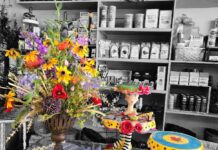 By Julie McConnell, UF/IFAS Extension
By Julie McConnell, UF/IFAS Extension
As we shift into cooler temperatures this fall you might not be thinking about warm season annuals, but this is a great time to plan your flower gardens and order seeds for spring. Some people are very organized gardeners and start seeds weeks ahead of time in peat pots or seed trays. I, on the other hand, am easily distracted and forget to water or water too much so I lean towards flowers that can be sown straight into the garden without a lot of fuss.
Zinnias Zinnia spp.
Zinnias are one of the easiest flowers to grow from seed and the variety selection is endless. Flowers can be simple with only a few rows of petals, dense pom-poms, and everything in between. Bloom colors include green, cream, yellow, red, orange, yellow, pink, purple, and even bicolor. Flower diameter and mature plant sizes vary and will fit any garden situation. Sow seeds directly into a sunny area of the garden from March to August and cover lightly with soil. Water daily for best germination if rainfall is not consistent. Zinnias make wonderful cut flowers and may last up to a week in an arrangement. If you leave spent flowers on the plants most varieties will reseed in the garden throughout the summer and the following spring. Fungal leaf spot is common, so avoid watering foliage during the summer and allow good air flow. No treatment is required for leaf spot.
Cosmos Cosmos spp.
The bright green feathery foliage of cosmos stands out in the garden for its unique fine texture topped by simple saucer-shaped flowers. Cosmos require full sun and good drainage which fits most Northwest Florida landscapes! Direct sow into the garden and lightly cover seeds with soil and water lightly for the first 5-7 days until seedlings emerge. After that only water if conditions are very dry as overwatering can lead to disease. Cosmo have low fertility needs, too much can reduce flowering. Mature size ranges from 1-6 feet tall and taller varieties may require staking. Cosmos are drought tolerant, not picky about soil pH, and attract butterflies and pollinators. This is an easy plant for tough sites and lazy gardeners!
Sunflowers Helianthus annus
 Nothing says fall like a field of sunflowers, but don’t think you have to wait until October, you can have them all summer long! The classic yellow petals with brown center flowers are not your only options in sunflowers; there are orange, red, cream, green, pink, and nearly black blooms available. Sunflowers attract butterflies, honey bees, specialized native bees, pollinators, and songbirds. Mature plant and flower sizes vary and another characteristic to look for is branching versus unbranched or “single-stem” sunflowers. Branched sunflowers have multiple flowers per stem offering prolonged blooming. Single-stem sunflowers bloom sooner and do not produce as many flowers as branched but are easier to use in cut flower arrangements. Sunflower seeds should be sown in sunny, well-drained soil after the last frost date (typically early April in Bay County) and lightly covered with soil. To keep a supply of sunflowers all summer, stagger planting every 7-10 days through late August.
Nothing says fall like a field of sunflowers, but don’t think you have to wait until October, you can have them all summer long! The classic yellow petals with brown center flowers are not your only options in sunflowers; there are orange, red, cream, green, pink, and nearly black blooms available. Sunflowers attract butterflies, honey bees, specialized native bees, pollinators, and songbirds. Mature plant and flower sizes vary and another characteristic to look for is branching versus unbranched or “single-stem” sunflowers. Branched sunflowers have multiple flowers per stem offering prolonged blooming. Single-stem sunflowers bloom sooner and do not produce as many flowers as branched but are easier to use in cut flower arrangements. Sunflower seeds should be sown in sunny, well-drained soil after the last frost date (typically early April in Bay County) and lightly covered with soil. To keep a supply of sunflowers all summer, stagger planting every 7-10 days through late August.
General Instructions for Seeding Annual Flowers
Most flowering annuals require full sun which is 6 or more hours of direct sunlight. Incorporating compost into the top 4 inches of sandy soil can help get seedlings off to a good start. Light watering during germination is helpful but overwatering after seedlings emerge can be detrimental. Light fertilization can benefit annual plants during their short life cycle, but always use the lowest rate on the product label and if they are performing well, they may not need any supplements. Deadheading (removing spent blooms) can encourage more flowers, but if you leave them some flowers will re-seed and provide a food source for wildlife.
For more information on these plants check out the links below:
Gardening with Annuals in Florida https://go.ufl.edu/1z75f5f
UF/IFAS Gardening Solutions Zinnias https://go.ufl.edu/ekifx73
An Equal Opportunity Institution. UF/IFAS Extension, University of Florida, Institute of Food and Agricultural Sciences, Andra Johnson, Dean. Single copies of UF/IFAS Extension publications (excluding 4-H and youth publications) are available free to Florida residents from county UF/IFAS Extension offices.

















































